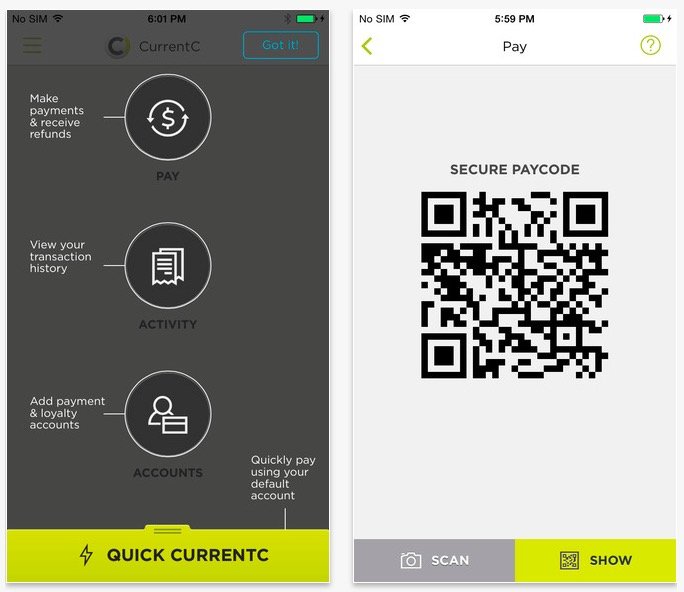Apple's iPhone-based Apple Pay service will soon see its first major competition in the mobile payments space as MCX consortium-backed solution CurrentC prepares to go public.
According to a report from MacWorld on Monday, CurrentC will exit limited trials and officially launch in one U.S. market over the next few months.
In a statement released today, CurrentC said initial availability "will be determined based on a number of factors, including retail support, infrastructure and consumer population."
Unlike Apple Pay, which completes credit and debit card-based transactions via touchless NFC technology, CurrentC relies on what some consider to be a less secure means of payment processing. With CurrentC, a customer uses their smartphone to take a picture of a one-time QR code generated at an MCX point-of-sale terminal. The payment amount is directly deducted from a user's bank account, which is linked with CurrentC on the backend.
Merchant Customer Exchange (MCX) CEO Dekkers Davidson previously noted POS terminals offering support for CurrentC are also compatible with NFC systems, meaning Apple Pay can technically be used on hardware at partner merchant locations. However, retailers in the consortium inked exclusivity agreements that preclude them from using alternative forms of electronic payment, something Davidson said was necessary for a successful rollout.
Backed by MCX, CurrentC entered the public eye after partner merchants CVS and Rite Aid pulled support for Apple Pay shortly after its debut in October. Other notable MCX retailers to deny Apple Pay transactions include Best Buy and Wal-Mart.
In November, however, Davidson said CurrentC's exclusivity timeline would be "measured in months, not years," meaning Apple Pay could show up at MCX merchants sooner than previously thought.
 AppleInsider Staff
AppleInsider Staff








 Andrew Orr
Andrew Orr
 Wesley Hilliard
Wesley Hilliard

 Oliver Haslam
Oliver Haslam
 Christine McKee
Christine McKee
 Amber Neely
Amber Neely








50 Comments
Lame and pointless for consumers.
I will not use it, will avoid merchants who do (and not ApplePay), and will tell them why.
Not directly to MY bank account it isn't.
No way I'm adding my checking account to anything like that.. They basically say they re doing this to put the fraud costs onto the account holder just to 'bypass' the credit card companies and 1 or 2 % processing fee. They don't care about the customer or the risks they put them at. In my mind, it makes them worse than CC companies.
Dumbest idea ever. You'd have to pay me to go through those lame steps.